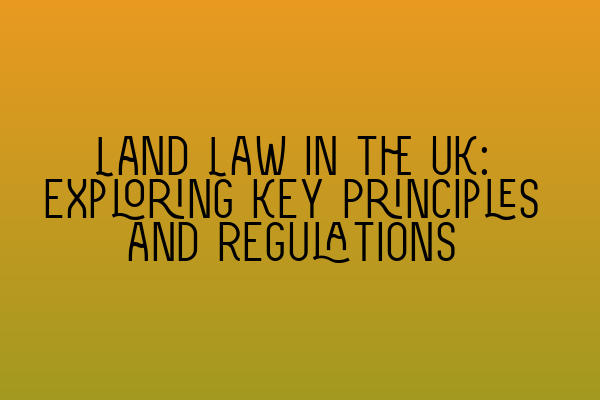Land Law in the UK: Exploring Key Principles and Regulations
As a solicitor specializing in property law, I understand the importance and complexity of land law in the UK. Whether you are a homeowner, a property investor, or a developer, having a solid understanding of land law is crucial for navigating through real estate transactions and ensuring legal compliance. In this blog post, we will delve into the key principles and regulations of land law in the UK, shedding light on the intricacies of this area of law.
1. Legal Framework:
The legal framework for land law in the UK is primarily based on statutory law, common law principles, and case law precedents. The primary legislation governing land law includes the Law of Property Act 1925 and the Land Registration Act 2002. These acts provide the foundation for defining and regulating property rights, land ownership, and land transactions.
2. Land Ownership:
In the UK, land can be owned in different ways, including freehold and leasehold ownership. Freehold ownership grants the owner full rights and control over the land, while leasehold ownership entails a lease agreement with a landlord, granting the tenant the right to occupy and use the land for a specified period. It’s important to understand the distinctions between these ownership types and their legal implications when dealing with land transactions.
3. Registered and Unregistered Land:
Another crucial aspect of land law in the UK is the concept of registered and unregistered land. Registered land refers to land that is recorded in the Land Registry, which is a government database documenting land ownership and other relevant details. Unregistered land, on the other hand, refers to land that has not been registered with the Land Registry. It is essential to determine whether land is registered or unregistered, as this can impact the legal requirements and procedures involved in acquiring or transferring land.
4. Land Registration:
Land registration is a vital component of land law in the UK, serving as a method of proving ownership and providing certainty in land transactions. The Land Registration Act 2002 introduced a system of electronic land registration, making it easier to search and verify land ownership. Registering land with the Land Registry offers protection against adverse possession claims and ensures that ownership details are readily accessible.
5. Easements and Covenants:
Easements and covenants are legal rights and obligations that may be attached to land. An easement is a right enjoyed by one landowner over another’s land, such as a right of way or a right to access utilities. Covenants, on the other hand, are obligations imposed on the owner of a particular land, such as restrictions on land use or maintenance obligations. Understanding the nature and enforceability of easements and covenants is crucial when dealing with land transactions and property disputes.
6. Adverse Possession:
Adverse possession, also known as squatter’s rights, is a legal concept that allows a person to obtain ownership of land by occupying it without the permission of the legal owner for a specified period. While adverse possession can be a complex and contentious area of land law, it highlights the importance of actively managing and protecting land ownership rights.
7. Planning and Development:
Planning and development regulations play a significant role in land law, ensuring that land use is controlled and aligned with local planning policies. Local authorities have the power to grant planning permission for development projects, and failure to comply with planning regulations can lead to legal complications and potential enforcement action. It is crucial to navigate the planning process carefully and seek legal advice to ensure compliance with all relevant regulations.
Conclusion:
Land law in the UK is a multifaceted and intricate area of law that underpins property rights and land transactions. By understanding the key principles and regulations of land law, individuals and businesses can confidently navigate the complexities of real estate transactions, protect their property rights, and ensure legal compliance.
At SQE Property Law & Land Law, we specialize in providing expert legal advice and services in all aspects of land law. Whether you require assistance with land registration, property transactions, or resolving property disputes, our team of experienced solicitors is here to help. Contact us today to learn more about how we can assist you in your property law matters.
Related Articles:
– SQE 1 Practice Exam Questions
– SQE 1 Practice Mocks FLK1 FLK2
– SQE 2 Preparation Courses
– SQE 1 Preparation Courses
– SRA SQE Exam Dates
